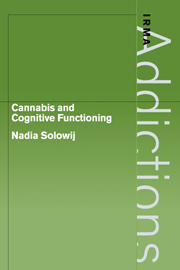Series editor's preface
Published online by Cambridge University Press: 16 September 2009
Summary
This book invites us to examine one single and sharply focused question – can exposure to cannabis result in any kind of long-term cognitive impairment? In considering that question, Dr Nadia Solowij firstly deploys a critical and comprehensive review of the relevant research literature. This part of her writing constitutes a significant contribution in its own right. Second, she reports and integrates the results of a series of experiments which she herself has conducted using event-related potential (ERP) techniques. The background review and her personal research are then together brought to bear on the common and core question. She weighs the evidence and tells us that the long-term use of cannabis may produce “impairment in the higher cognitive functions of memory, attention, and the organisation and integration of complex functions”, with that impairment not necessarily recoverable on abstinence.
That is the nub of the matter. Dr Solowij's conclusions are tentative, but if further work confirms her findings there are public health implications of potentially profound importance. Policies on cannabis are at present for the most part, and inevitably, the time warp residuum of positions taken in the absence of knowledge. The present findings should neither be used for scaremongering nor dismissed with easy comfort: in one corner of this complex field Dr Solowij gives us the beginnings of rather worrying knowledge, even though the impairments she describes are subtle in nature.
It has been my privilege to work with Dr Solowij on the preparation of this text for publication.
Information
- Type
- Chapter
- Information
- Cannabis and Cognitive Functioning , pp. xiii - xivPublisher: Cambridge University PressPrint publication year: 1998
